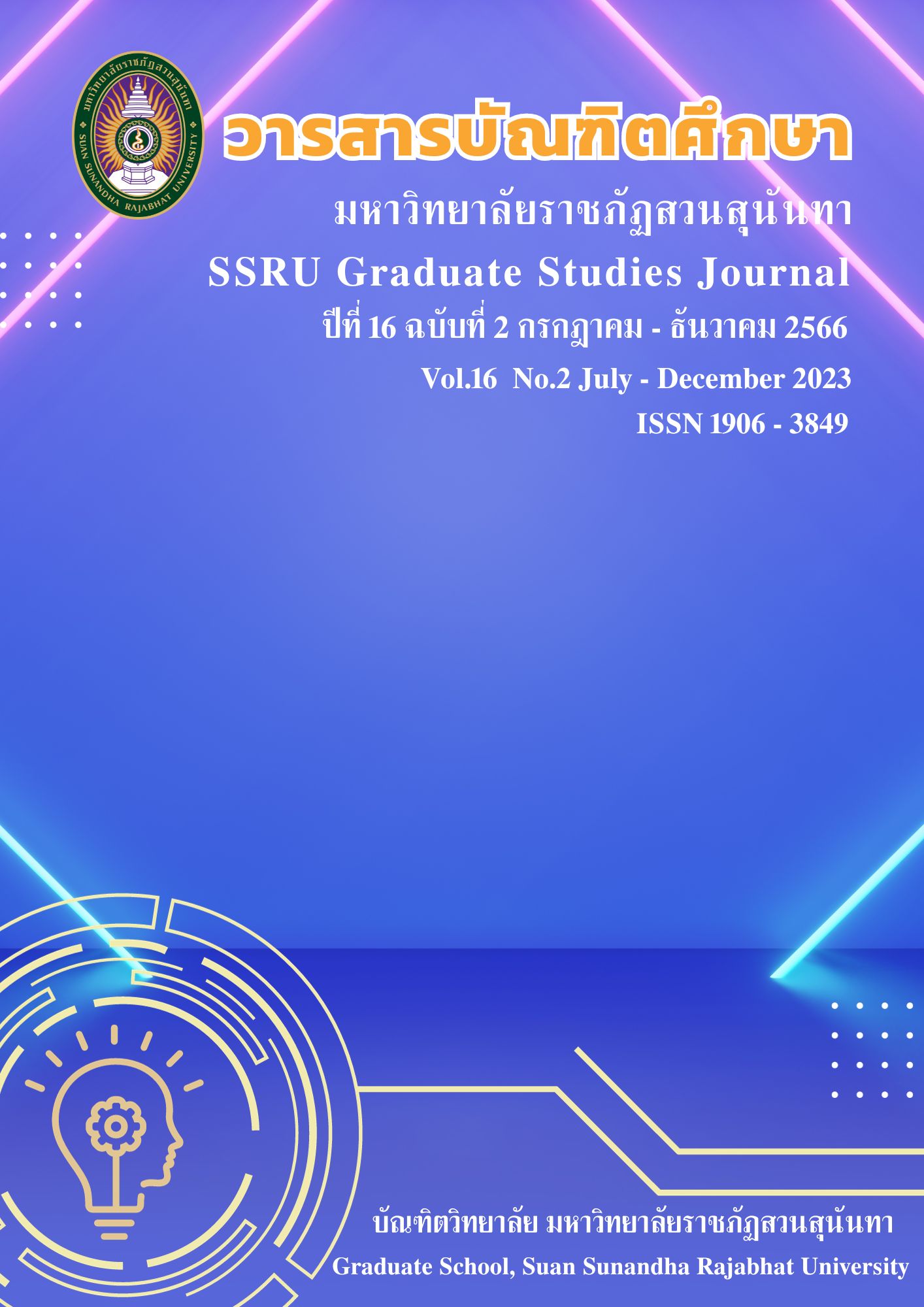การศึกษาแนวทางการพัฒนาเทศบาลเมืองบุรีรัมย์ให้เป็นเมืองอัจฉริยะ ด้านขนส่งอัจฉริยะ
Main Article Content
บทคัดย่อ
การศึกษาครั้งนี้มีวัตถุประสงค์เพื่อ 1) ศึกษาปัจจัยการขับเคลื่อนเมืองอัจฉริยะ ด้านขนส่งอัจฉริยะ และ 2) ศึกษาปัจจัยการขับเคลื่อนเมืองอัจฉริยะ ด้านขนส่งอัจฉริยะที่ส่งผลต่อความสำเร็จในการเป็นเมืองอัจฉริยะ ด้านการขนส่งอัจฉริยะ เครื่องมือที่ใช้ในการศึกษา คือ แบบสอบถาม กลุ่มตัวอย่างคือ บุคลากรภาครัฐที่มีส่วนเกี่ยวข้องกับภารกิจงานด้านการขนส่ง จำนวน 356 ตัวอย่าง สถิติที่ใช้ในการศึกษา คือ สถิติเชิงพรรณนา ได้แก่ ค่าเฉลี่ย (Mean) ส่วนเบี่ยงเบนมาตรฐาน (Standard Deviation) ค่าความถี่ (Frequency) และร้อยละ (Percentage) และสถิติเชิงอนุมาณ ได้แก่ การวิเคราะห์ความถดถอยแบบพหุคูณ (Multiple Regression Analysis) ผลการศึกษา พบว่า
1. ผู้ตอบแบบสอบถาม ส่วนใหญ่เป็นเพศหญิง คิดเป็นร้อยละ 50.9 มีอายุ 25 – 35 ปี คิดเป็นร้อยละ 35.6 มีสถานภาพสมรส คิดเป็นร้อยละ 52.8 มีการศึกษาระดับปริญญาตรี คิดเป็นร้อยละ 65.9 มีอาชีพข้าราชการ คิดเป็นร้อยละ 24.7 และมีอาชีพลูกจ้างประจำ คิดเป็นร้อยละ 24.7 มีรายได้ต่อเดือน 15,001 – 25,000 บาท คิดเป็นร้อยละ 41.6 สังกัดแขวงทางหลวงจังหวัดบุรีรัมย์ คิดเป็นร้อยละ 46.9 มีตำแหน่งอื่น ๆ คิดเป็นร้อยละ 32.8 และมีหน้าที่ด้านบริหารงานทั่วไป คิดเป็นร้อยละ 32.8
2. ปัจจัยการขับเคลื่อนเมืองอัจฉริยะ ด้านขนส่งอัจฉริยะ ของเทศบาลเมืองบุรีรัมย์ ปัจจัยที่มีค่าเฉลี่ยมากที่สุด คือ ด้านผู้นำ มีค่าเฉลี่ยอยู่ในระดับมาก ( = 4.05, S.D. = 0.76) รองลงมาคือ ด้านการมีส่วนร่วมของประชาชน มีค่าเฉลี่ยอยู่ในระดับมาก (
= 3.91, S.D. = 0.84) และน้อยที่สุด คือ ด้านการวิจัยและพัฒนาด้านเทคโนโลยีและนวัตกรรม มีค่าเฉลี่ยอยู่ในระดับมาก (
= 3.72, S.D. = 0.79) ตามลำดับ
3. ผลการวิเคราะห์ความถดถอยแบบพหุคูณของปัจจัยการขับเคลื่อนเมืองอัจฉริยะ ด้านขนส่งอัจฉริยะที่ส่งผลต่อความสำเร็จในการเป็นเมืองอัจฉริยะ พบว่ามี 2 ปัจจัย ได้แก่ ปัจจัยด้านโครงสร้างพื้นฐาน (INF) และปัจจัยด้านเจตจำนงทางการเมือง (POL) อย่างมีนัยยะ สำคัญที่ 0.05 (p-value < 0.05) ซึ่งมีผลต่อความสำเร็จในการเป็นเมืองอัจฉริยะ ด้านการขนส่งอัจฉริยะ ในด้านการเข้าถึงโครงข่ายการคมนาคมขนส่ง/ระบบขนส่งสาธารณะ (Accessibility: ACC) เท่ากับ 14.70% นอกนั้นเป็นอิทธิพลปัจจัยอื่น ๆ ที่ไม่ได้นำมาศึกษาในครั้งนี้
Article Details

อนุญาตภายใต้เงื่อนไข Creative Commons Attribution-NonCommercial-NoDerivatives 4.0 International License.
เอกสารอ้างอิง
คณะกรรมการขับเคลื่อนการพัฒนาเมืองอัจฉริยะ. (2561). แผนแม่บทการพัฒนาเมืองอัจฉริยะประเทศไทย. สืบค้นจาก http://www.depa.or.th/sites/default/files/publication/files/Master%20Plan%20Draft%20v%200.3.pdf
จุฑาทิพย์ กิจรักษา และศุภวัฒนากร วงศ์ธนวสุ. (2562). การเปรียบเทียบตัวชี้วัดการเป็นเมืองที่มีการเดินทางอัจฉริยะ. วารสารมหาวิทยาลัยมหากุฎราชวิทยาลัย วิทยาเขตร้อยเอ็ด, 9(2), 379-390.
เจนณรงค์ พันธุ์จันทึก และฌาน เรืองธรรมสิงห์. (2562). การพัฒนาเมืองขอนแก่นให้เป็นเมืองอัจฉริยะ: พัฒนาการและความก้าวหน้า. ใน การประชุมวิชาการระดับชาติด้านการบริหารกิจการสาธารณะยุคดิจิทัล ครั้งที่ 5 (น. 581-592). ขอนแก่น: มหาวิทยาลัยขอนแก่น.
ธนาจุฑา กังสกุลนิติ. (2562). แนวทางการพัฒนาเมืองอัจฉริยะในประเทศไทยในอนาคต. กรุงเทพ: สถาบันส่งเสริมการบริหารกิจการบ้านเมืองที่ดี.
นันทวัน วงศ์ขจรกิตติ. (2559). นโยบายการให้บริการจังหวัดอัจฉริยะของประเทศไทย. วารสารวิจัยและพัฒนาวไลยอลงกรณ์ในพระบรมราชูปถัมภ์, 11(3), 365-377.
แผนพัฒนาเศรษฐกิจและสังคมแห่งชาติ ฉบับที่ 13 (พ.ศ. 2566 – 2570). (2565, 1 พฤศจิกายน). ราชกิจจานุเบกษา (เล่มที่ 139 ตอนพิเศษ 258 ง, น. 1-143). สืบค้นจาก https://www.nesdc.go.th/download/Plan13/Doc/Plan13_Final.pdf
พวงเพชร ทองหมื่นไวย และสัญญา เคณาภูมิ. (2560). กลไกความร่วมมือระหว่างหน่วยงานภาครัฐและเอกชนในการดำเนินการพัฒนาเมืองอัจฉริยะ. วารสารสถาบันวิจัยและพัฒนา มหาวิทยาลัยราชภัฏมหาสารคาม, 4(1), 43–52.
ภาวิณี เอี่ยมตระกูล และคณะ. (2560). กรอบการวิเคราะห์นโยบายการวางแผนการพัฒนาพื้นที่บริเวณรอบสถานีขนส่งมวลชนเพื่อการพัฒนาเมืองอย่างยั่งยืน. คณะสถาปัตยกรรมศาสตร์และการผังเมือง: มหาวิทยาลัยธรรมศาสตร์.
ศิริวัฒน์ เจนรังสรรค์ และวิมลสิริ แสงกรด. (2562). การพัฒนาเทศบาลเมืองให้เป็นเมืองอัจฉริยะในพื้นที่จังหวัดขอนแก่น. วิทยาลัยการปกครองท้องถิ่น: มหาวิทยาลัยขอนแก่น.
ศิริวรรณ เสรีรัตน์ และคณะ. (2560). การบริหารการตลาดยุคใหม่. กรุงเทพฯ: ธรรมสาร.
สำนักงานส่งเสริมเศรษฐกิจดิจิทัล. (2561). คู่มือการจัดทำแผนพัฒนาเมืองอัจฉริยะ. กรุงเทพฯ.
Maldonado Silveira Alonso Munhoz, P. A., et al., (2020). Smart mobility: The main drivers for increasing the intelligence of urban mobility. Sustainability, 12(24), 10675.
Myeong et al. (2018). A study on Determinant Factors in Smart City Development: An Analytic Hierarchy Process Analysis. [online] Retrieved from https://www.mdpi.com/2071-1050/10/8/2606


